
You’re a Java developer. You’re smart. You develop complexities.
But when it comes to writing a resume that shows off your talents, you’re lost.
We understand. Creating a resume isn’t the easiest of tasks, especially for a job as specific as a Java developer.
Do you include a portfolio of pieces you’ve developed?
How different should your resume be from a senior developer?
There are many questions that need to be answered before creating a winning resume.
Follow this guide for a step-by-step process to creating a resume that puts the odds massively in your favor.
This includes:
- An complete Java developer resume article
- How to write a Java developer resume
- The latest tips & tricks to make your Java developer resume stand out
To give you an idea of what you can achieve, here’s a Java developer resume example, created with our very own online resume builder:
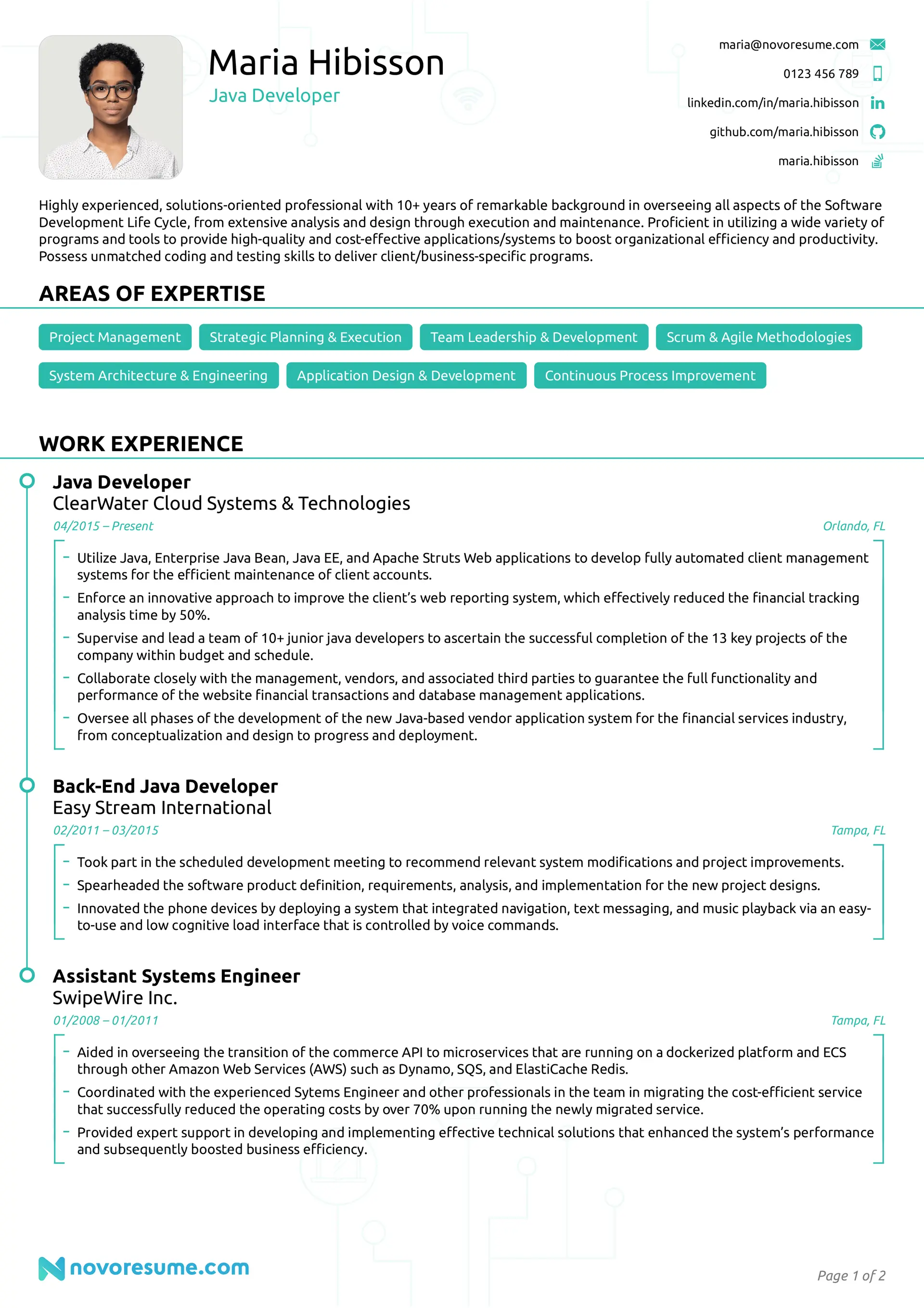
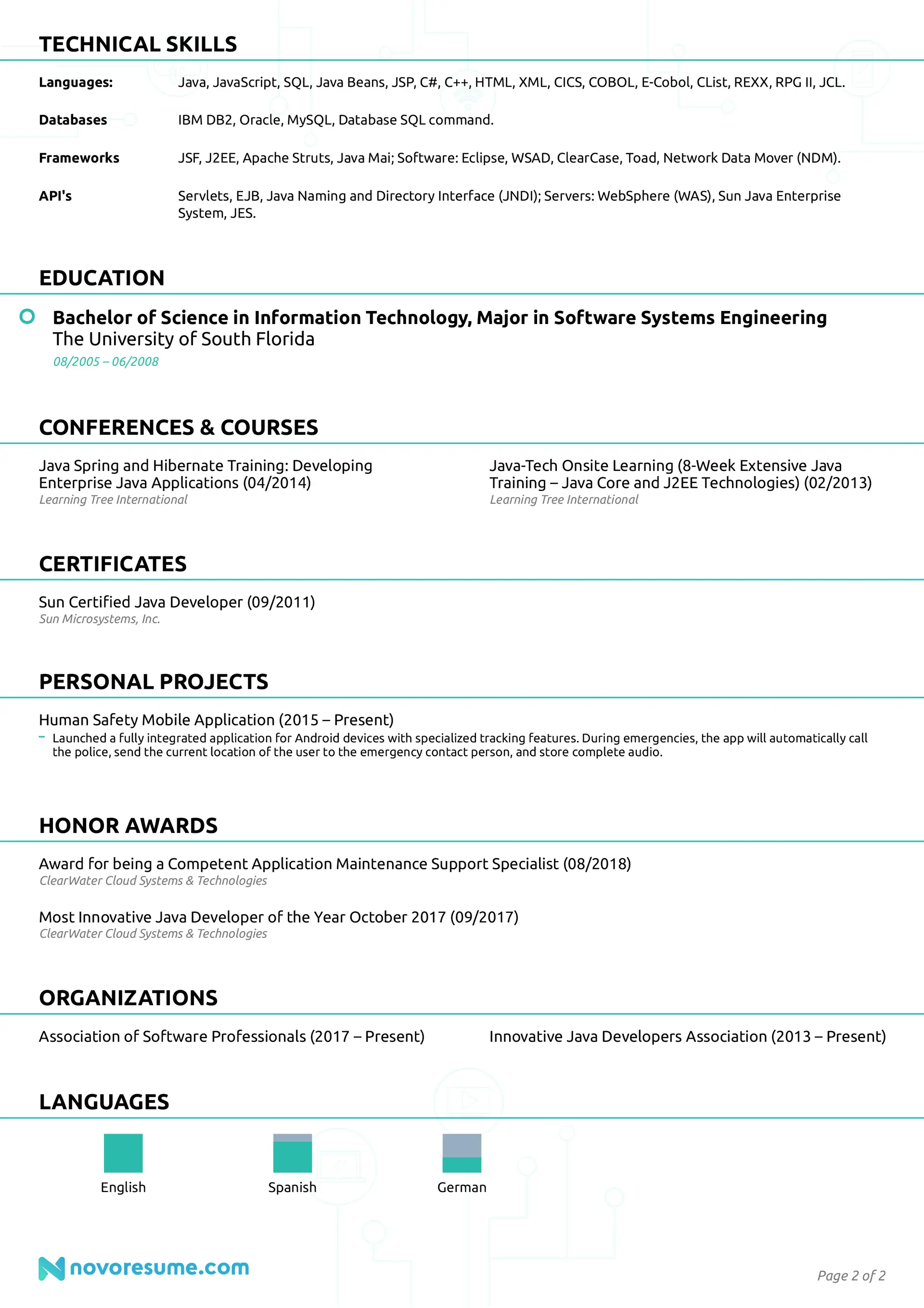
So now you know what’s possible with the correct format and structure. Simply follow the steps below to create a professional resume of your own.
Looking for a different resume example in the computer science field? Check out our extensive list of resume examples here:
- Software Engineer Resume
- Web Developer Resume
- Computer Science Resume
- Artificial Intelligence Engineer Resume
- Data Analyst Resume
- Data Entry Resume
- Data Scientist Resume
- Engineering Resume
- IT Resume
How to Format a Java Developer Resume
Although your job is complex, your resume should be clear and concise.
Choosing the correct format allows you to encapsulate the complex nature of JavaScript.
“Reverse-chronological” is the most common resume format in the professional world. As such, this is our recommended resume format for Java developers.
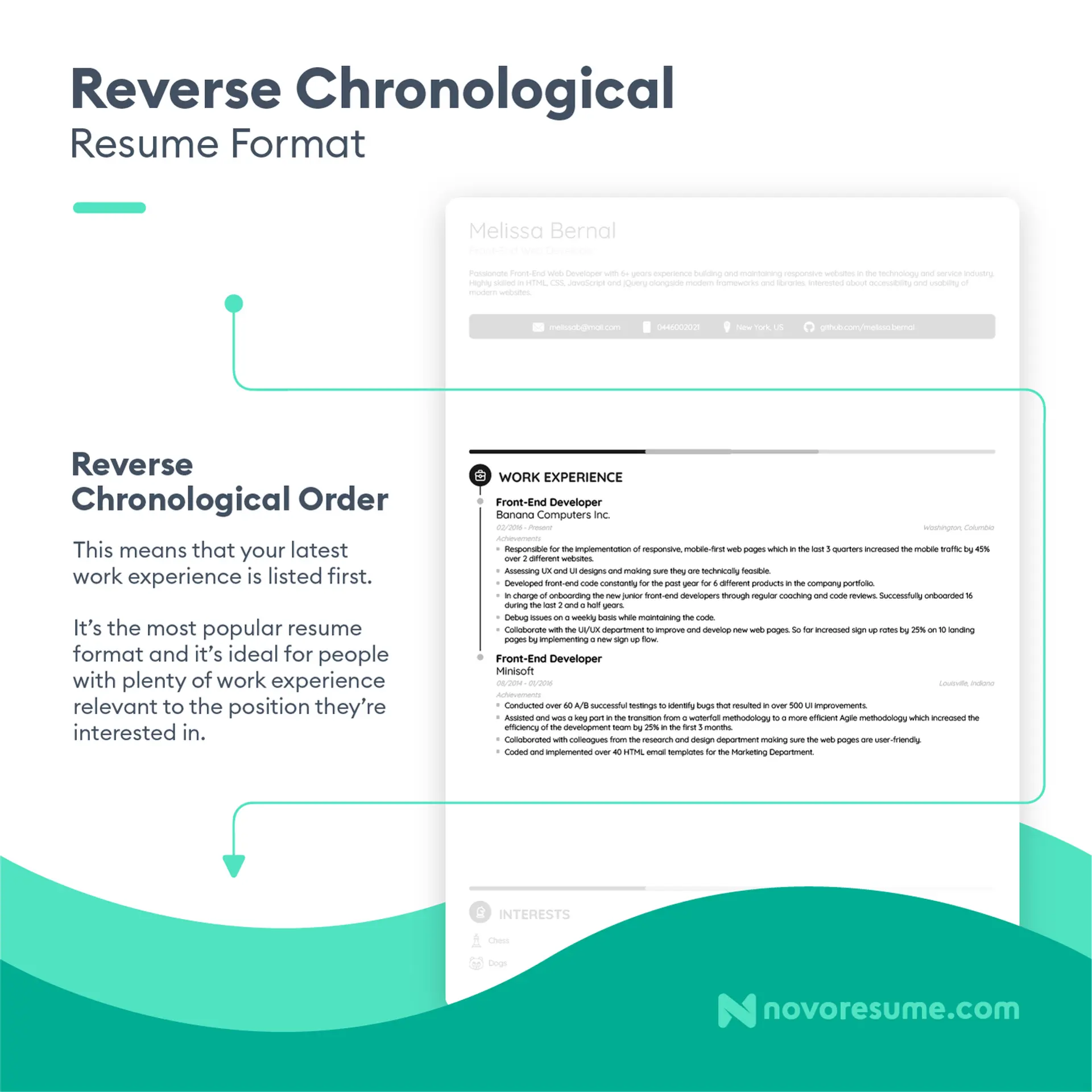
The following resume formats also get our approval:
- Functional Resume – This is the format for those who have a strong knowledge of Java, but have little work experience. If you’re a self-taught coder, this is the format for you.
- Combination Resume – As the name suggests, this format combines both “Functional” and “Reverse-Chronological.” If you have a wealth of experience to back up your skills, a combination resume would be the smarter option.
With your format taken care of, you need to select the correct resume layout.
A professional resume needs:
- Margins - One-inch margins on all sides
- Font - Pick a professional font that stands out.
- Font Size - Use a font size of 11-12pt for normal text and 14-16pt for headers
- Line Spacing - Use 1.0 or 1.15 line spacing
- Resume Length - Don’t go over the 1-page limit. For guidance, view these one-page resume templates.
To completely skip the formatting issues, use a professional resume template.
What to Include in a Java Developer Resume
The main sections in a Java developer resume are:
- Work Experience
- Contact Information
- Portfolio
- Skills
- Education
Want to go a step further? You can also add these optional sections:
- Awards & Certification
- Projects
- Languages
- Interests & Hobbies
Read on to find out what to write under each section.
If you want to learn more about resume sections, view our guide on What to Put on a Resume.
How to Correctly Display your Contact Information
As a developer, you know that there can’t be any mistakes in your code. Well, the contact section in the resume is exactly the same. Entering incorrect information will deem the resume useless – disaster!
The contact information section must include:
- Full Name
- Title - The same as the job title you’re applying for - “Java Developer”
- Phone Number - The number you are most reachable on
- Email Address - Use a professional email address (firstname.lastname@gmail.com), not a silly one (tim12345678@gmail.com)
- Portfolio Link - GitHub, Stack Overflow, Personal Website
- (Optional) Location
Correct Example:
- Tim Smith - Java Developer. 101-358-6095. tsmith@gmail.com
Incorrect Example:
- Tim Smith - Java Coding King. 101-358-6095. timisjavaking@gmail.com
How to Write a Java Developer Resume Summary or Objective
Here’s an interesting, yet important fact for you...recruiters spend less than 6 seconds on each resume!
This sounds extremely short, but bear in mind that recruiters usually have hundreds of resumes to go through.
As such, your resume needs to deliver a positive reaction within the first few lines. To do this, use a resume summary or objective.
If you’ve ever coded a website, you’ll know that call to actions should be placed “above the fold”. Well, it’s the same concept with your resume. The top of your resume should have an objective or summary section that hooks the reader.
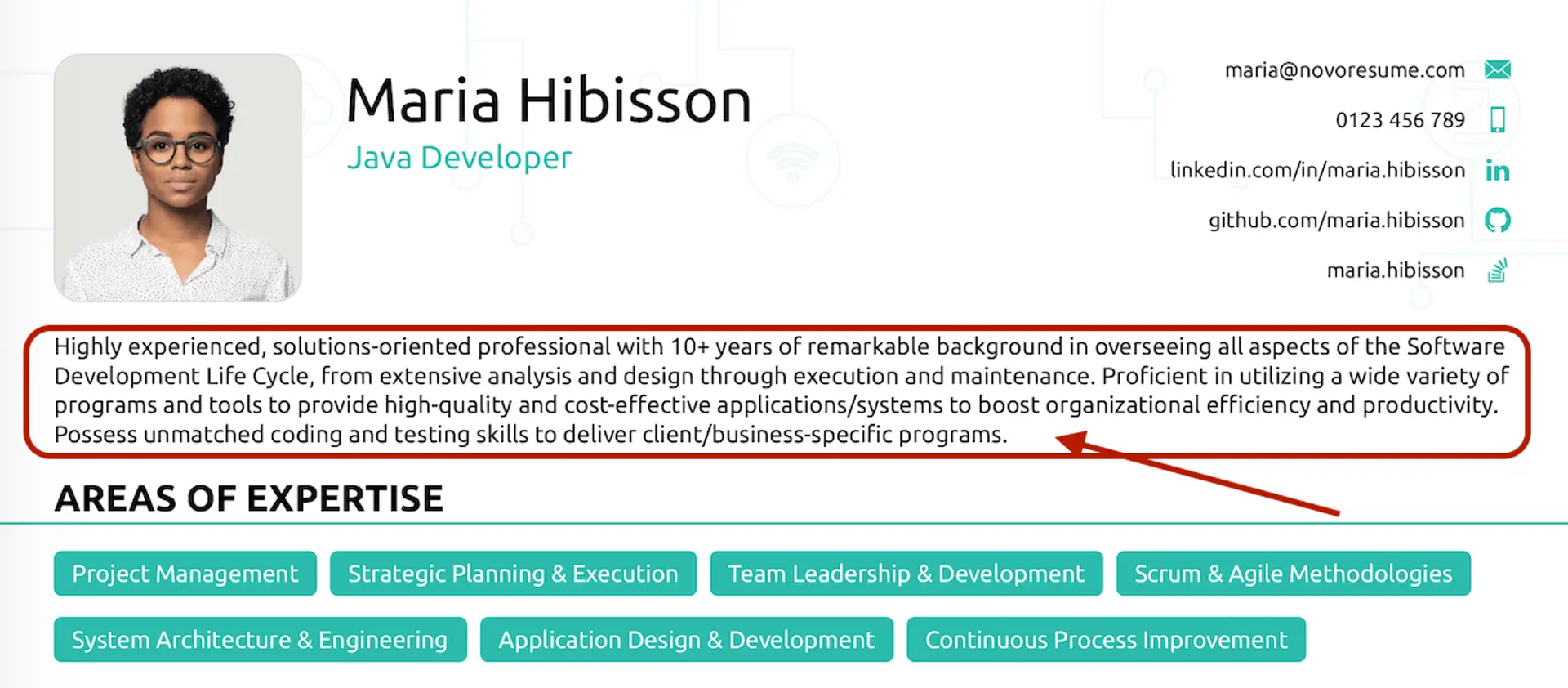
Now, the two sound the same, but there is a slight difference:
A resume summary is a 2-4 sentence paragraph that summarizes your greatest achievements and relevant work experience.
Java Developer Resume Summary Example
- Enthusiastic and reliable Java Developer with a strong JavaScript knowledge base. 4+ years of industry experience as part of a computer program development team. Proficient at being able to clearly explain complex computer development concepts to a variety of audiences.
A resume objective is a 2-4 sentence paragraph that focuses on your skills and delves into your professional aspirations.
Java Developer Resume Objective Example
- Enthusiastic and highly-skilled Java Developer looking for a junior role at Company X. Experience includes developing apps, websites, and complex programs while at University X. Skilled in PL/SQL, Oracle, MySQL, Tomcat Apache, Ajax VB, JavaScript, ASP, CSS, and HTML, and more.
So, which should a Java developer choose?
We would usually recommend going with a dummary, as it clearly shows your relevant work experience. However, as you’re going for a junior position, you will likely be better suited to an objective.
How to Make Your Java Developer Work Experience Stand Out
A developer should be someone that you can trust. The hiring company needs someone they can rely on. To grow confidence in the recruiter, list any work experience you have.
Here’s the best way to structure your work experience section:
- Position name
- Company Name
- Dates
- Responsibilities & Achievements
Here’s an example:
Junior Java DeveloperHedgeFinancial04/2016 - 02/2020- Updated 1000+ existing applications and modules
- Used HTML and JavaScript to design form validation programs
- Improved functionality of web applications with JSP and Servlets
Remember, competition is fierce. Your work experience is another chance for you to separate yourself from other applicants. As such, concentrate on your achievements, not just your daily tasks.
Swap:
“Web applications manager”
For:
“Improved functionality of web applications with JSP and Servlets”
It is easy to see which one is better (clue – it’s the second). It shows that you can use a number of protocols, and that you were successful in doing so. Using more in-depth answers will help the recruiter to visualize how you can benefit their company.
What if You Don’t Have Work Experience?
Are you a graduate looking for a foot in the door?
Perhaps you’re an experienced developer, but new to JavaScript?
Don’t worry if you don’t have much experience, companies will know that junior developers won’t have years of experience under their belt.
With that said, companies want developers they can rely on, so any experience can be an advantage. One of the easiest and most efficient ways to gain trust and show your skills is via a portfolio.
If you already have a portfolio that acts as proof to your JavaScript skills, simply add a link in your resume (we will take you through this very shortly).
However, if you don’t have a portfolio, it’s not too late. A day or two of coding will be enough – there’s no need to create a game-changing app or anything.
Fortunately, the skills of a Java developer are in high demand, so there are a few ways to build a portfolio:
- Complete freelancing gigs on UpWork
- Offer your services to friends and family
- Start your own project, website, app, etc.
Students will be interested in reading our student resume guide!
Use Action Words to Make Your Java Developer Resume POP!
“Made”
“Worked”
“Responsible for”
…are all words that the recruiter can’t escape from. You see, resumes all feature the same common words.
A top tip to separate you from the competition is to use power words. The following words allow your resume to stand out:
- Conceptualized
- Determined
- Formulated
- Initiated
- Spearheaded
How to Correctly List your Education
After talking about your real-world experience, you should mention your education.
This section requires listing your education history in the following format:
- Degree Type & Major
- University Name
- Years Studied
- GPA, Honours, Courses, and anything else you might want to add
Here’s a quick example:
B.A. in Computer ScienceHavard University2012-2016- Relevant Courses: Fundamentals of computer science, compliers and operating systems, information theory, systems and architecture, web applications and databases, and data structures
- GPA: 3.8
Here are some frequently asked questions in relation to education:
I’m still in education, should I still disclose it?
- You should mention every year of education to date, even if you have yet to graduate
Should I include my high school education if I have a degree?
- No. Only include your highest qualifications
Is experience more important than education?
- Recruiters value experience over education, so talk about your experiences first and foremost
Here’s more information on how to put your education on a resume.
Top 10 Skills for a Java Developer Resume
Being a Java developer requires a lot of technological knowledge and skills. This certainly isn’t a job that you can “fake it till you make it”. As such, you need to make the recruiter aware of your skill set.
Remember, the hiring manager has never seen you work before. Don’t let somebody with fewer skills than you get the job, just because their resume actually included a list of the skills they can perform.
Here are some of the most common java developer skills:
Hard Skills:
- Java Virtual Machine (JVM)
- JavaScript Pages (JSP)
- Service-oriented architecture – SOAP/REST
- Web technologies – HTML, CSS, JQuery
- Web frameworks – Struts and Spring
Soft Skills:
- Communication
- Time management
- Team player
- Critical thinking
- Work well under pressure
Pro Tip:
- Generally, soft skills don’t have as much weight as hard skills. You see, applicants tend to list loads of soft skills, knowing that it’ll be hard for the hiring manager/interviewer to test. Any Java developer can say they have problem solving skills, but not many have a vast knowledge of service-oriented architecture use every CMS.
Here’s a more comprehensive list of 101+ must-have skills this year.
What Else Can You Include?
Now that we’ve covered the essentials, is there anything else we can add?
Well, if you want to get an interview, yes!
Doing the basics correctly should be enough to get you shortlisted, but adding these extra sections can be the deciding factor.
Awards & Certifications
Have you won any awards during your studies?
Have you completed any third-party courses?
Said yes to any of these questions? Definitely mention them in your resume!
Here’s an example:
Awards & Certificates
- “Building Scalable Java Microservices” - Coursera Certificate
- “Learning How to Learn - Coursera Certificate
- “Critical Thinking” - MadeUpUniversity
Projects
Companies will have a preference for applicants that have a passion for computer science.
Showing that you have personal projects is one of the best ways to show that you have a passion for the job, and not just there for a pay check.
Many developers have their own side projects, so don’t be left behind.
But don’t worry, it’s not too late. Here a few ideas to get you started:
- Developing your own app/website as a side project
- Writing about JavaScript for a blog
- Freelance work on job boards
If done correctly, the projects section should look like this on your resume.
Languages
Now, you’re likely thinking “how does my second language relate to my Java skills?”
And to be honest, it doesn’t.
But even though it doesn’t impact your daily job, being able to speak a second language is always impressive.
As such, include a language section if you have space.
Rank the languages by proficiency:
- Native
- Fluent
- Proficient
- Intermediate
- Basic
Interests & Hobbies
Now, you are likely wondering, “I’m a skilled developer, why would I talk about my love of hiking?”
Well, hobbies reveal WHO you are.
People who have interests outside of work tent to be great additions to the office.
Here are some great hobbies & interests you may want to include in your resume.
Include a Cover Letter with Your Resume
If you want an advantage over the sea of other applicants, you should include a cover letter with your resume.
A well-written cover letter allows you to go into more depth and fill in any blank spaces in your Java developer resume. But most importantly, a cover letter allows you to make a personal connection.
Here’s how to structure a winning cover letter.
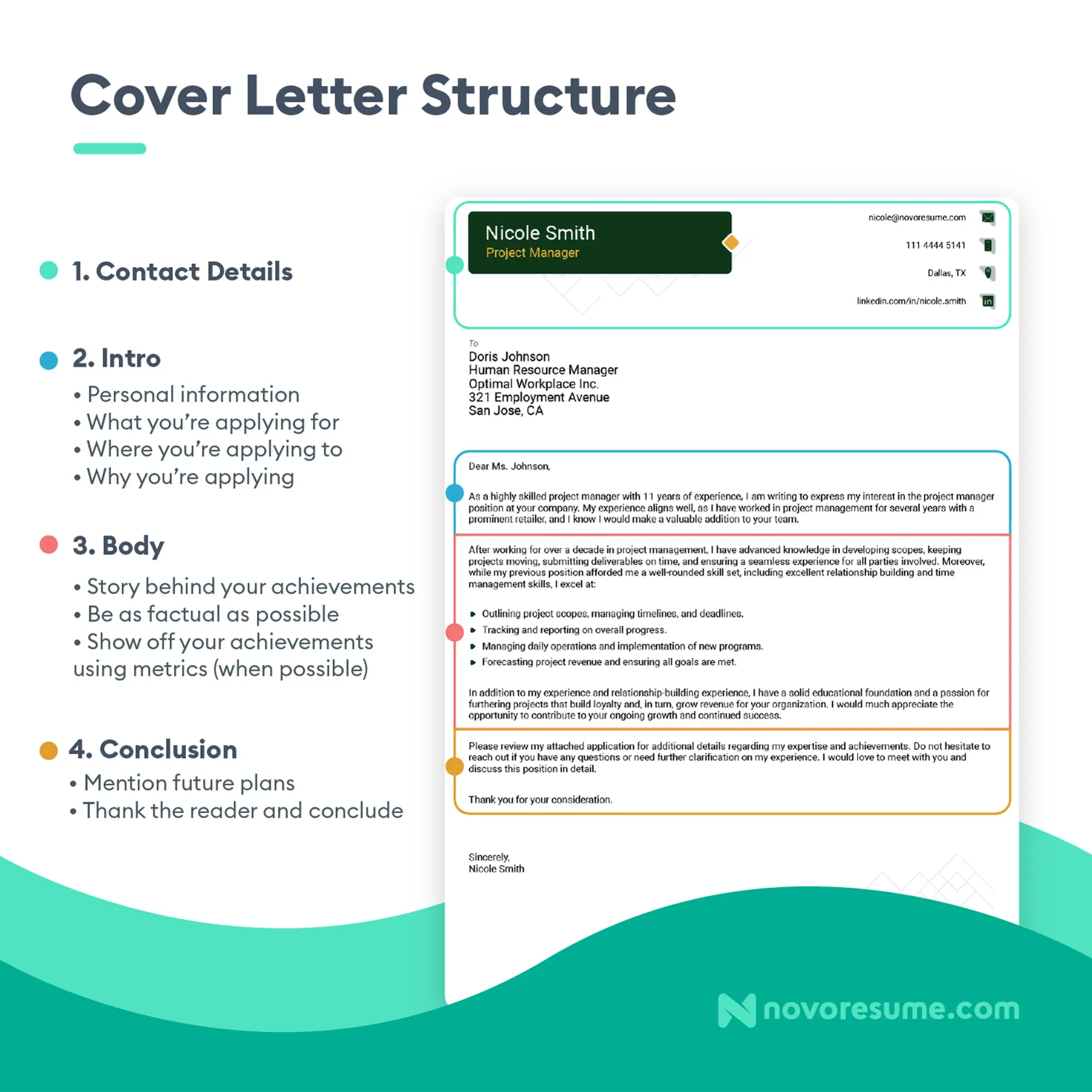
You should complete the following sections.
Personal Contact Information
Your full name, profession, email, phone number, location, and website (or GitHub / Stack Overflow).
Hiring Manager’s Contact Information
Full name, position, location, email
Opening Paragraph
As we mentioned earlier, hiring managers skim through documents. As such, you need a powerful opening paragraph with short sentences and concise language that mentions…
- The position you’re applying for
- The summary of your achievements
The Body
Once you have their attention, you can get to the specifics:
- Why you chose this specific company
- What you know about the company
- How are your top skills relevant for the job
- Which similar industries or positions have you worked in before
Closing Paragraph
Don’t just end the conversation abruptly, you should:
- Conclude the points made in the body paragraph
- Thank the hiring manager for the opportunity
- Finish with a call to action. This is a good way to start a conversation. A simple “At your earliest opportunity, I’d love to discuss more about how I can help company X” will work
Formal Salutations
Close in a professional manner. Something like, “Kind regards” or “Sincerely.”
To feel even more inspired, please read our step-by-step guide on how to write a cover letter.
Key Takeaways
Congrats!
Follow the advice in this guide to create a resume that increases your chances of getting that elusive junior Java developer job.
Here’s a quick rundown and what we’ve learned:
- Before writing your resume, you need the correct format. We recommend using the reverse-chronological format or functional format (as you’ll likely have little work experience).
- Use an objective or summary at the top of the resume to hook the recruiter.
- Focus on your work achievements rather than your work responsibilities.
- Link to your portfolio of work. Examples of your work will separate your application from the competition.
- For a personal touch, include a cover letter with the resume.
